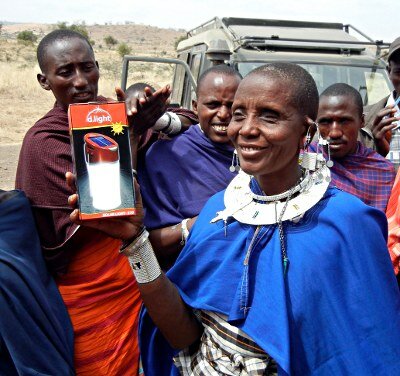Ambassador Jessica Matthys, a student at Castilleja High School in Palo Alto, CA, delivers 50 solar lanterns to the Olmoti women and children’s clinic and surrounding Maasai community in northern Tanzania.
Jessica’s story:
After three days of travelling by plane and Land Rover, my family arrives at beautiful west Kilimanjaro. Vast plains and rolling hills dotted with Maasai “bomas” or communities covered in dry vegetation stretch out in the distance in every direction.
The Maasai are polygamist herders of cows and goats, so there are a lot of children and animals playing everywhere. Their diet consists of utilizing the cow to its fullest extent (oil, milk, yogurt, meat, blood) as well as some vegetables.
For the fortunate families with a flashlight, it is property of the elder man. Typically women have only a kerosene lantern which pollutes the air. The lantern is used only for the most necessary occasions because the oil is expensive, and the only way for a married woman to make money is to make beaded handicrafts or sell cow products at the market. Replacing the kerosene lantern is the main reason why my family brings fifty solar lights to distribute to the Maasai through the clinic, with fifty more in the mail.
The clinic was originally created as a place for the local midwife to deliver children, and now it has expanded with a patients wing and the capacity to give basic medicines and vaccinations to the surrounding Maasai communities. We tour around the clinic, which already has two solar suitcases to power machines and give light. There is most definitely a need for further lighting, so some of the lights we brought over to Tanzania went to the clinic itself.
 When we arrive outside to distribute the lights, a crowd of women, children and a few young men form. I even recognize a few from the Maasai village I visited! A founder of the clinic inspires the crowd with a speech about the lights in Maasai. As names are called out, each family sends one representative to collect the light. She shakes my hand, thanking me.
When we arrive outside to distribute the lights, a crowd of women, children and a few young men form. I even recognize a few from the Maasai village I visited! A founder of the clinic inspires the crowd with a speech about the lights in Maasai. As names are called out, each family sends one representative to collect the light. She shakes my hand, thanking me.
I say one of the only words I know in Maasai: “ashe” or thank you. The solar lanterns will make a significant impact on these women’s lives. They will feel less dependant on their husbands when making money from bead work, and be able to gather firewood and fetch water more easily.
I look forward to seeing how the presence of these solar lights have changed their lives, in these ways and maybe in others I cannot imagine.

